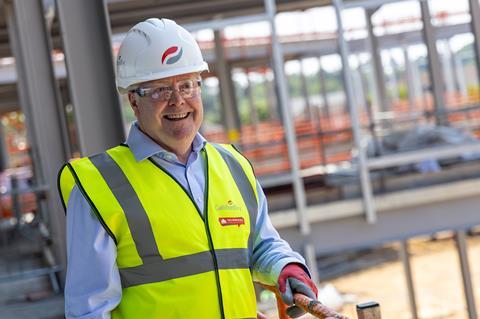Galliford Try has said it has been asked to look at taking over work that collapsed contractor ISG had been expected to carry out.
Chief executive Bill Hocking said public sector clients had got in touch with the firm asking it to run the rule on jobs where ISG was a framework contractor.
“It’s framework positions in the public sector, stuff that’s not in the ground yet,” he said.
“We’re not too keen on taking anything halfway through,” he said, adding that clients needed to move quickly to get jobs left stranded by the firm’s demise back up and running again. “The faster they act, the better. Penny pinching will cost [clients] a lot more than time.”

Chief executive Bill Hocking said the firm expects to take on some former ISG staff
Hocking said the firm was also looking to take on staff made redundant following ISG’s administration and added: “We are talking to their HR people about staff coming across. [ISG’s collapse] is not good for anybody. For the staff, the supply chain or the industry.”
He was speaking as the firm said revenue in the year to June was up 27% to £1.8bn with pre-tax profit up from £10m to £31m. Average month-end cash was up 15% to £155m while its order book edged up 3% to £3.8bn.
Hocking said the firm carries out 90% of its work in the public and regulated sectors, such as water, and added that its record set of results had been down to better risk management.
“It all falls around that,” he said. “Every single job in the order book we can do, day in, day out with confidence. We turn away rubbish because you always regret the rubbish later on. Firms fall over because they don’t stick to a disciplined strategy.”
He said the firm’s move into affordable housing is expected to produce an income of around £250m by 2030 with the company expecting to build around 1,200 units for that sort of revenue.
“We’re going in as a contractor, we’re building blocks of flats for local councils and residential providers” he said, adding that the firm would eventually move into mixed-use tenure jobs.
Galliford Try has set itself a profit margin target of 4% by 2030 with this year’s operting margin standing at 2.5%. Hocking said the 4% number was attainable and added that clients were beginning to pay more money rather than see firms go to the wall. “They’ve started to realise it’s better to pay a bit more than save a bit of money here and there.”
The firm said its year-end dividend payment would be 11.5p on top of the 4p interim dividend it paid out earlier in the year. The final dividend of 15.5p is a rise of 48% on last time.

